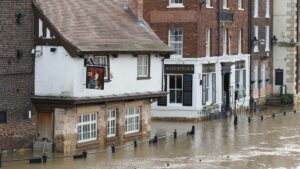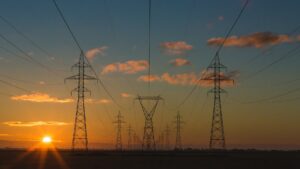Eco Anxiety: “a fairly recent psychological disorder afflicting an increasing number of individuals who worry about the environmental crisis.”
Phsycology Today
Caroline Hickman, Psychologist and lecturer at Bath University recently gave a talk on Eco Anxiety.
This talk was of particular interest to me as I am, like many others, struggling to comprehend the complexity and challenges of tackling climate change. I have come to terms with the fact that, as one individual, the enormity of the subject is too big to fully comprehend. However, that does not stop my patterns of thought fluctuating from being hopeful that humanity can solve the crisis one minute, to despair and fear of annihilation the next. Caroline describes these two extremes as the “Sheep of Doom” and the “Shark of Hope” and says that we can be both at the same time i.e. to be both hopeless and hopeful.
Caroline argued that Eco Anxiety is not an individual anxiety but a collective pathology. We need to be alarmed, we should all be feeling it. As Caroline pointed out: we are adapted to a time scale of threat such as a sabre-tooth tiger attacking our cave, but we cannot relate to the timescales of climate change in the same way. Climate change isn’t something we have encountered before; it is “well beyond any previous human experience, we have got nothing that can help us prepare for this, this is taking us down paths that we can barely even imagine.” So, it isn’t surprising that we aren’t able to face this alone. I think this is key to why it is such a challenge to not only realize the threat, but also how to figure out a solution as it is so different to our previous experiences. It would be so much easier if the cause and effect were instant!
Climate change is taking us on an emotional journey that has no precedent, “we don’t really know how to navigate these and we wish it wasn’t really happening.” This is an as yet unfaced threat, she went on, “whether we like it or not, as human beings we are going to have to face change around us, it is taking us down terrifying new paths.” Therefore we need to accept our feeling and learn how to deal with the guilt/shame/horror first by facing it head on. We can’t go around things; we have to go through them. “We need to face up to our feelings of grief, loss, despair, rage, hopelessness, by turning towards these feelings to help find the solutions we need.”. “It is human nature not to want to go down these paths, we don’t want to face feelings of guilt and shame and loss and fear and anxiety, why on earth would we?….but paradoxically we have to because it is those unresolved feelings about climate change are getting in the way of sustainable change for the future”.
Caroline explained that in order to change our despair into passion, we need to figure out what we can do and take action. We need to apologise for the role we have played and then, we can shift our emotional relationship to enable us to be more emotionally resilient. This isn’t an easy path, the only way to develop true resilience is by failure. We need to be in control, but we don’t need “Naive hope, we need radical hope”. For radical hope we need both despair and radical optimism, but positive messages are dangerous as it is too late. “If we are going to have sustainable change, we have to understand how we feel about this and not just the science, we need to have compassion, respect and understanding for the other perspective”. This approach of facing these emotions head on and turning despair into action will be a continual challenge but I am determined, it won’t be perfect but we must pull together, as a lot of people doing things imperfectly will make all the difference. I am lucky that the Greengauge team also are passionate about reducing our impact on the planet, having people around who are prepared to face the challenge head on makes all the difference.
Facing both the “Sheep of Doom” and the “Shark of Hope” paradox will be a challenge. Caroline says, it is a journey where the only way through is by “facing our vulnerability, painful truths, collective denial, grief and loss that we will be able to develop the emotionally informed and sustainable action that we need to take to save ourselves as well as the planet. These inner ‘untrodden paths’ through our defences and complex feelings about climate change might just hold some of the answers we need, and counter intuitively show us the way.”
Talk hosted by Climate Friendly Bradford on Avon: https://climatefriendlybradfordonavon.co.uk/)
Caroline’s Website: https://www.carolinehickmantherapy.com/
Written by Emma Mathias-Jones





